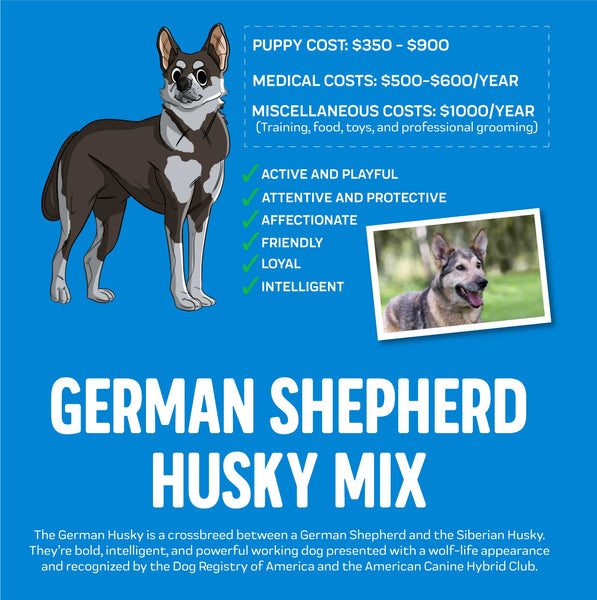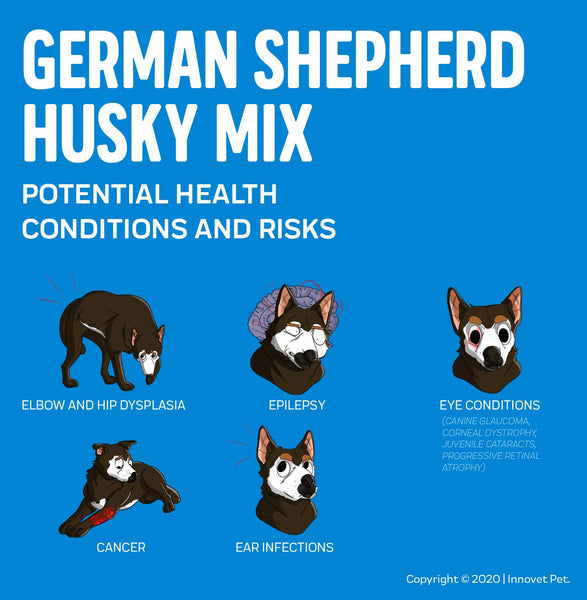Often called the Gerberian Shepsky (that’s a mouthful!), they can also go by the name of German Husky, Husky-Shepherd, and the Siberian Shepherd.
Read on to find out more about the German Shepherd Husky mix and whether or not it would make the ideal choice for you and your household.
TABLE OF CONTENTS
1. What Is A German Shepherd Husky Mix?
2. A Look Into the Origins of the German Shepherd Husky
3. Physical Characteristics of the German Shepherd Husky Mix
4. Temperamental Characteristics
5. Potential Health Conditions and Risks
6. Maintenance of the German Shepherd Husky Mix
7. Environment and Living Conditions
8. Price and Costs of a German Shepherd Husky Mix
9. FAQs

What Is A German Shepherd Husky Mix?
Much compared to the Cockapoo or the Labradoodle, the German Husky is a crossbreed between a German Shepherd and the Siberian Husky. Crossbreeds have been existing for as long as we know it - but they often go unnoticed.
It isn’t until recently that crossbreeds have begun to attract more attention than they once used to. In fact, the German Shepherd and Husky mix had existed long before they were even named the Gerberian Shepsky!
The German Shepherd Husky mix is a bold, intelligent, and powerful working dog presented with a wolf-life appearance and recognized by the Dog Registry of America and the American Canine Hybrid Club.
A Look Into the Origins of the German Shepherd Husky
With the combination of two loyal, hardworking and intelligent canines, the Gerberian Shepsky is by nature an Alpha. With origins from the German Shepherd and Siberian Husky, this Shepsky is definitely an all-in-one pooch.
Let’s take a look at the origins of its parents to take a closer look at the traits the German Husky carries.
German Shepherd
The German Shepherd dates back to its origins in the late 1800’s. The very first German Shepherd was named the Horand von Grafrath, and all German Shepherds we know descended initially from him.
German Shepherds were the ideal dream of the German army captain, Max von Stephanitz. The very first dog that Stephanitz caught eyes on as his ideal canine was then named the Horand von Grafrath.
The American Kennel Club officially recognized the breed in 1908, and from there, the German Shepherd is now the second-most famous canine in the world.
Siberian Husky
The Siberian Husky descended from the dogs initially bred as companions and sled pulling dogs by the Chukchi in North-East Siberia. Their distinct body and coat were built for ideal cold climates out in the frozen lands.
The Siberian Husky caught headlines in the 1900s after a relay of Siberian Huskies won a sled race of 659 miles in just five and a half days lead by Leonhard Seppala.
Seppala’s lead husky, Balto, is still considered to be one of the most honored hero canines after 1925 during a lifesaving medicine run to Nome, Alaska, and has brought popularity amongst Huskies ranking them at the 12th most popular breeds in the world.

Physical Characteristics of the German Shepherd Husky Mix
As with all crossbreeds, the puppy will most likely inherit characteristics from both of the parents. It will vary from litter to litter, and not all puppies will be the same.
Some puppies will inherit more characteristics from one parent than the other, and others may inherit just about the same characteristics from both parents.
Nonetheless, they are still some of the cutest puppies you will lay your eyes upon!
Distinct Facial Features
A Husky German Shepherd Mix will naturally have pointed ears and a distinct, wolf-like appearance. Sometimes, they can also inherit beautiful blue eyes, or dual-colored eye colors often associated with the husky.
Lifespan
On average, the lifespan of the Gerberian Shepsky is usually between 10 to 13 years, sometimes as long as up to 18 years old.
They may vary according to a multitude of factors, such as genetics, diet, overall health, activity and exercise, and lifestyle.
Size and Weight
The Siberian Husky is an average 20 - 23 inches tall and fall into the medium-sized category, weighing in at about 35 - 60 pounds. German Shepherds are an average of 22 - 26 inches tall and fall into the large-sized category and weigh in at about 49 - 88 pounds.
On average, a Gerberian Shepsky can fall into a mix of either the two categories, in both size and weight.
Coat
Since both parents have a thick double coat, it is likely that the German Shepherd Husky mix will have a thick coat as well that may either be long or short, dense or soft, to protect the breed from colder climates, like the Husky.
Colors
Many German Shepherd Huskies appear darker regarding of color, and that is because darker shades of colors dominate over lighter colors. Lighter color coated dogs of this breed usually are derived from two parents that are white, or of a lighter color.

The following are the possible German Shepherd Husky Mix color varieties that may be pure or mixed together in the coat color:
- Black
- Blue
- Cream
- Golden
- Gray
- Light Brown
- Pepper
- Red
- White
Temperamental Characteristics
The German Shepherd Husky Mix is a bold and muscular dog, often portraying a healthy dog to be feared. However, the Gerberian Shepsky is actually calm and gentle, along with some other great personality and temperamental traits that make him a great pet and working companion.
Active and Playful
This dog is full of energy, and that means that they need regular exercise. Without adequate exercise, the dog may resort to negative behaviors such as excessive barking and chewing due to cooped up stress and lack of exercise.
These dogs need at least one, long, and strenuous walk per day - or a large, fenced backyard to be able to run around.
Attentive and Protective
These dogs are very attentive and can make excellent guard dogs. These traits come from both of the parents, but as a result, the dog has also been known to be an excessive barker due to its attentiveness to sound.
Affectionate
These dogs are very affectionate and loving at heart, and will absolutely never refuse a good pet or belly rub.
Friendly
This breed mixes well with other people and can be friendly - as long as the dog has been properly socialized and can trust the person, and doesn’t feel threatened by them.
Loyal
A fantastic trait that many owners seek out is loyalty, and these dogs will never fail or disappoint when it comes to that. Their priority will be to put you before themselves, and if that isn’t loyal - we aren’t sure what is!
Intelligent
This dog has higher cognitive levels and abilities comped to some other breeds. A higher intelligence level means it’s easier to train them, as they can catch on to new things very quickly - even for the difficult tasks.

Potential Health Conditions and Risks
In crossbreeds, there are genetic variations, unlike in purebred dogs. Here is a list of a few health conditions that are common in the German Shepherd Husky Mix.
Elbow and Hip Dysplasia
Elbow and Hip Dysplasia are health conditions that result in loose and unstable joints in dogs, but these conditions are also easily preventable with a healthy diet, adequate exercise, and proper relieving of stress.
This condition is most commonly brought on by obesity, so it is essential to keep your dog’s weight on point, making sure that he is not too obese, or underweight.
Eye Conditions
Canine glaucoma
A canine glaucoma is a group of diseases that affect the optic nerve in dogs and results in pressure on the eye. About 40% of dogs affected by this condition become blind in the affected eye within the first year.
Corneal dystrophy
This acute eye condition leads an accumulation of abnormal materials located in the dog’s cornea (outer layer of the eyes and can result in visual impairment with development over time.
Juvenile cataracts
This condition may appear as early as 5 months old, and in severe cases, may progress into complete blindness by the pup’s first birthday.
Progressive retinal atrophy
This hereditary condition may occur during the dog’s twilight years, or at older ages. Symptoms of this condition include dilated pupils, inability to see in bright light conditions, and night blindness.
Although the condition is incurable, early diagnosis may assist in helping further protect your dog’s vision.
Epilepsy
Epilepsy is a neurological disorder that results in uncontrolled and recurring seizures, and in some cases, may or may not lose consciousness.
If your dog is suffering from seizures and epilepsy, you may want to look into using Innovet's CBD Oil for Pets with Seizures- users all around the world and pet owners have numerous testimonials, and counting, have sought instant relief by it for their pets suffering from epilepsy.
Cancer
German Shepherd and Siberian Huskies are prone to cancer, much like some other dog breeds. Depending on the health of the dog, cancer may also develop into other types of specific cancers.
Ear Infections

Dogs that have large ears are prone to ear infections, such as the German Shepherd Husky Mix. This can be prevented with regular cleaning and inspection of the ears. It is best to use natural ear cleaning products and soft silicone tips to thoroughly and safely clean your dog’s ears.
You can check out our PurOtic Natural Pet Ear Cleaning products , made entirely of natural ingredients and a pharmaceutical grade emulsifier for a comfortable and safe alternative to market products that contain harsh chemicals and can potentially harm your pet’s health.
Maintenance of the German Shepherd Husky Mix
Grooming and Shedding
The Gerberian Shepsky is a moderate shedder, so if you’re planning on bringing this dog home, you’ll have to make sure that no one in the family has allergies. If someone in the family does have allergies, you may want to consider looking into hypoallergenic dogs.
Since the Gerberian Shepsky has a double coat, he will have to be brushed 2-3 times in a week to main the coat and remove excess fur that may occasionally shed, especially during the changing of the seasons.
You should never consider shaving a German Shepherd Husky Mix, as this can lead to a multitude of problems related with shaving a double coated dog - particularly skin problems.
Exercise and Training
As with owning any dog, it is particularly important that you practice proper training and socialization as early as possible, while your dog is still in the puppy stage.
Because the German Shepherd Husky Mix is quite an intelligent dog, he is quick to learn.
You’ll have to enforce the following factors to ensure proper training:
- Consistency
- Engagement
- Firmness
- Reinforcement
Exercise should be adequate. This dog can withstand high intensity of exercise without tiring a single bit - and they can make perfect exercise companions.
Diet
These dogs are in the larger sized breed category so you will need to ensure that they are getting the proper nutrition for large breeds. Improper nutrition may result in adverse effects on their growth, and it is vital that you prepare a well-balanced meal full of nutrients, high quality, and packed with vitamins.
An ideal amount would be at least 3 cups of high-quality kibble each day, with some enticing wet food occasionally.
Be sure that your dog also has access to a clean water supply throughout the day.
Environment and Living Conditions
The German Shepherd Husky Mix is a relatively large dog, and because the dog is also quite active, it is highly recommended that you have a large, suitable place for your dog to roam free and be able to get enough exercise at the same time.
An ideal living condition for this dog would be a house, or especially a large, fenced backyard.
If you don’t have time for daily walks, a backyard is adequate to play some good games of fetch, fly-ball, tug of war, or even an agility training course.
The climate should be a moderately cold climate, mainly because of the dog’s double coat. The last thing you would want is to have a dog of this particular breed living in a hot, humid, and desert-like climate! We, humans, find that very uncomfortable, and even more for a dog with a double coat!
Price and Costs of a German Shepherd Husky Mix
A German Shepherd Husky Mix will typically cost around $350 - $900 for the puppy alone.
Medical costs per year will amount to $500-$600.
Miscellaneous costs, including training, food, toys, and professional grooming will add up to an extra $1000 per year, given that these are not concerning medical issues.
FAQs
Will a German Shepherd Husky fit with a family?
One of the more significant concerns when it comes to considering a more extensive, mixed breed, is how they interact with children in a family. Luckily, the German Shepherd Husky mix is overall very gentle with children but temperamental and sturdy to stand whatever goofy acts children will play upon them.
However, you will still need to ensure that your pup gets adequate and proper training during his growth as a puppy to reinforce proper socialization skills.
Is a German Shepherd Husky right for me?
If you have thoroughly read through this article and weighed the options, a question you’re probably still pondering on is if a German Sheperd Husky mix is the right dog for you.
Let’s answer that with another question.
Can you make the commitment of raising the dog, given all of the above?
They’re absolutely one of the cutest, smartest, and devoted four-legged companions to choose from, but it’s also important to remember that these dogs will require continuous training (as they love to learn things and work on new tricks regularly and will need a lot of exercises.
If you are a first-time dog owner and find yourself out of the house most of the time, or all day, you may not be the right fit for this dog.
If you are an experienced dog owner, have owned a dog before, and are active and love sports, then this may be the right fit for you!
Where can I buy a Gerberian Shepsky?
If you have considered all of the pros and cons to buying this particular breed, and have decided that this definitely is the right breed for you, another good question is where to buy a German Shepherd Husky Mix dog?
When buying this dog, you’ll want to look for trusted breeders that specialize in this type of crossbreed. Be sure that you check the legitimacy of the breeder, the litter, and the living conditions of the puppies, as well as the health conditions.
You should always visit a litter to see them first hand, learn about the parents, and should be able to see the parents personally, too, to determine the legitimacy of the litter.
Adopting is an entirely admirable approach because nothing beats the feeling of giving hope to an adult dog just dreaming of coming to a new home and family.
The only downside is that the dog may not be an absolute cross between a German Shepherd and a Siberian Husky, and the health conditions throughout its heritage...but one thing’s for sure, he will definitely love you as equally as other dogs would!
Sources:
German Shepherd DogGerman Shepherd Dog
Life with a German Shepherd
German Shepherd: Dog Breed Profile
5 Things to Know About German Shepherd Dogs















